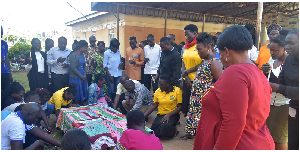 Staff of Taso light candles during the International Aids Candlelight Memorial Day
Staff of Taso light candles during the International Aids Candlelight Memorial Day
Health workers in Acholi Sub-region are concerned about the rising incidents of non-adherence to life-saving antiretrovirals (ARVs) medication among people living with HIV/Aids.
Mr Walter Okema, the Gulu area manager for The Aids Support Organisation (Taso), said they lost connection with about 300 individuals between January and March this year, emphasizing the severity of the issue.
“In the last quarter, that is, January to March, we lost about 300 clients out of the 8,959. We have constituted a team that is doing a massive follow-up for those clients who missed their appointment or those who interrupted treatment,” he said on Monday.
Lack of adherence to treatment is attributed to factors such as long distances to health facilities, transportation challenges, fear of disclosure in new relationships, and socio-economic hardships.
Ms Florence Apiyo, a caregiver in Apaa, Amuru District, highlighted the dire circumstances faced by patients in remote areas.
“We don’t have any health centres here, even if you are sick, we don’t have any money to go to a health centre. Now, like those who have HIV, sometimes they are missing drugs because they don’t have money,’’ she said.
Mercy Atim, an adolescent peer supporter at Taso in Gulu, underscored the challenges in providing services and care for children and adolescents living with HIV.
She mentioned stigma, unsupportive caregivers, and poor access to monitoring and medication as significant barriers.
“This is causing poor adherence to drugs among children, which is why we are having a high viral load,” she said.
Mr Herbert Onen, a clinician in Gulu City, emphasised the broader consequences of non-adherence to ARV medication.
“We have noticed a very big burden of late and that is non-suppression. We have observed that some HIV clients are not suppressing the virus; now, because they are not suppressing the virus, they stand a chance of spreading it, or they stand a chance of developing advanced HIV disease,’’ he said.
The medics said efforts are underway to analyse the root causes of non-adherence and provide intensive counselling to promote treatment adherence.
In terms of HIV prevalence in Acholi, Ms Juliet Aunu, a health worker, highlighted the region’s alarming statistics.
“The HIV prevalence in the Acholi Sub-region stands at 7.4 percent higher than the 5.3 percent, national prevalence,” she said.
New cases were reduced by 72 percent from 11,358 in 2017 to 3,175 in 2021.
Mr Victor Rwengabo, the mid-north zonal coordinator for the Uganda Aids Commission, outlined various factors driving HIV transmission, including risky sexual behaviours and alcohol consumption.
To address these challenges, extensive awareness campaigns and service delivery initiatives focusing on prevention and treatment are being implemented.
“Collaborative efforts between healthcare providers, communities, and government bodies are essential to ensure effective treatment," he said.